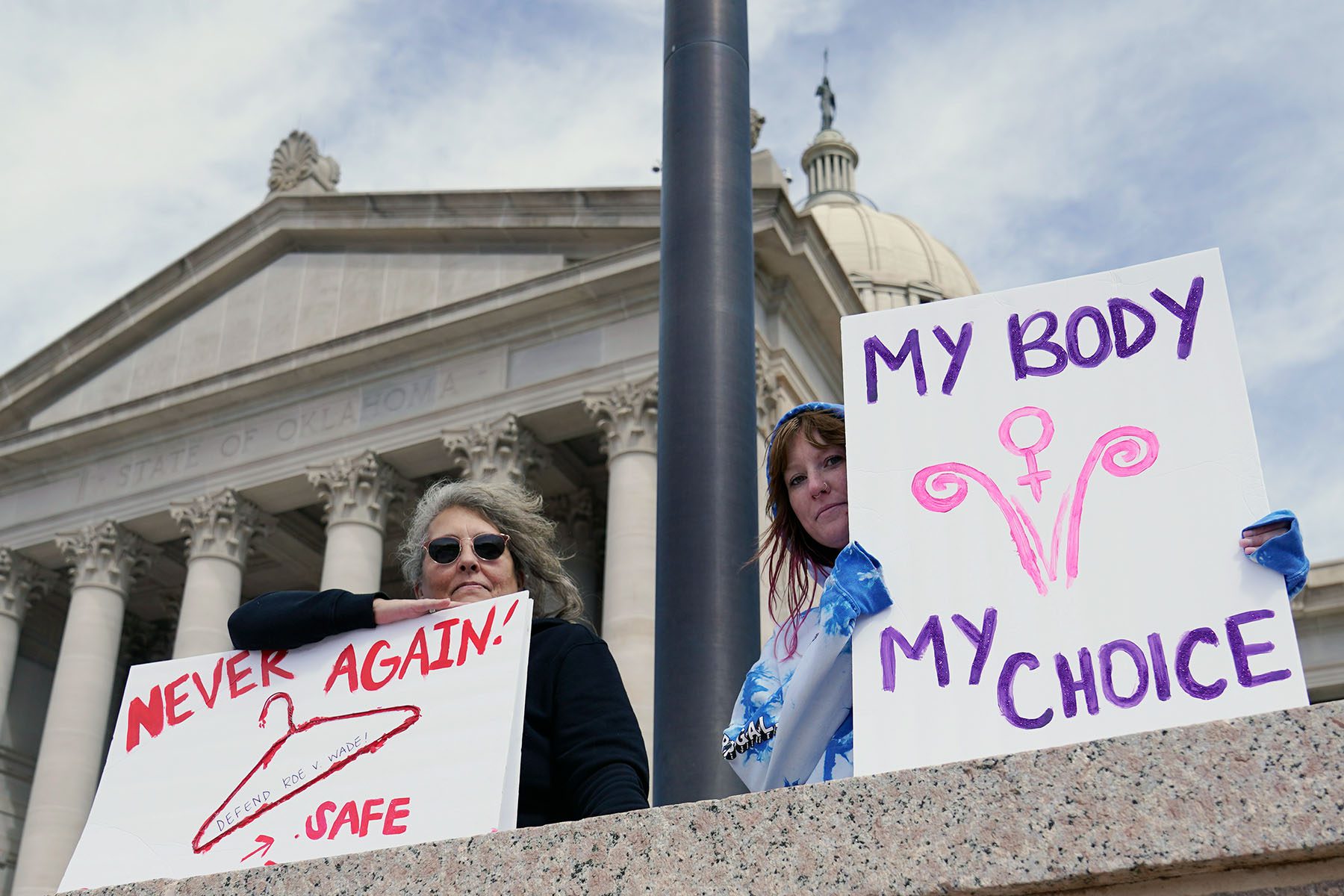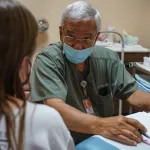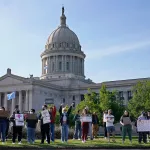OKLAHOMA CITY, OK — The clinic had stopped scheduling patients weeks ago, but the phones haven’t stopped ringing.
Trust Women has received an average of 134 calls each day in April. Since last September, the tiny clinic in southwestern Oklahoma has doubled the number of patients it saw, thanks to a Texas law that ended in-state access to the majority of abortions and it became a critical access point for the procedure. But in March, abortion stopped at Trust Women, too.
The clinic, along with the state’s three others, has been roiled the past few months by the crush of abortion restrictions moving through the Oklahoma legislature, which has passed one new ban and has six other potential restrictions pending, including two inspired by Texas.
Even though no new ban has taken effect, the impacts are already being felt in clinics. Some are halting or drastically reducing services — by the end of March, terrified abortions that could be banned at any minute, clinic staff at Trust Women temporarily stopped scheduling in-state abortions. Others are booking patients for appointments that they do not believe they will be able to keep. Texans and Oklahomans alike are already being directed to Kansas, Colorado, Arkansas and New Mexico.
All of it has made it even more difficult for patients to get an abortion in Oklahoma, which has over the past several months become a regional nexus for access.
Lawmakers pushed ban after ban: The Senate approved a resolution that would allow voters to amend the state constitution so it does not explicitly protect abortion rights; that is awaiting a House vote. It passed a six-week ban that relies on civil lawsuits to be enforced. The House passed a total abortion ban, also relying on civil lawsuits. And the House resuscitated a Senate bill from last year that would criminalize all abortions. That one, the only one to so far be signed into law this year, is set to take effect in August.
-
More abortion coverage from The 19th
- Oklahoma was key to abortion access for Texans. Now, the state could ban the procedure entirely.
- Medication abortions — the most common method of ending a pregnancy — are growing significantly more expensive
- Kentucky is the first state to end virtually all in-state abortions
The legislature has until Thursday for its remaining bills to be passed by the other chamber. The governor has indicated that he would sign both the civil-lawsuit-based six-week ban and the similar total ban. If enacted, either bill would take effect immediately. It means that each day could be the last for most or all legal abortions in Oklahoma.
With that deadline looming, the Trust Women staff told themselves they couldn’t keep saying no. Resuming appointments meant running the risk of scheduling patients they’d have to cancel. But the alternative — sitting, waiting and doing nothing — felt worse.
“It’s hard just to be in this void of uncertainty,” Kailey Voellinger, the clinic’s director, said this past Thursday. “But I’m at this point now of thinking, we might as well schedule patients now, because why not? We have the time. Let’s do it. And in a worst case blow-up situation, we’ll get our patients to Kansas the same day.”
They booked 19 patients for this past Friday, April 22, their first clinic day since March 31. The doctor, who was flying in from California, would come early to the clinic — 7:30 a.m. sharp — so that they could start performing abortions right away. If a surprise ban happened, they figured, they’d have helped as many patients as possible.
To minimize the number of overnight procedures, which could be legal when started but outlawed the next morning, they stopped scheduling abortions for patients who were later than 16 weeks of pregnancy. (Currently, Oklahoma allows abortions up to just shy of 22 weeks, but after 16 weeks of pregnancy, overnight procedures are more often necessary.)
And they told patients about the looming risk.
“There is a possibility you could get canceled, and have to reschedule for Kansas,” a clinic employee warned a caller as she booked her appointment Thursday morning.
It’s a chance some patients are taking. But for others, Voellinger said, it’s too risky. Warned that they could lose their appointment that very day, some are seeking care from other clinics. Others, she suspects, are giving up altogether.
The flood of people coming after Texas’ ban took effect made banning abortion in Oklahoma even more critical for anti-abortion activists.
“There absolutely was an urge to get this passed, just because our [parking] lots are full of Texas license plates,” said Bailee Brown, a senior at Oklahoma Baptist University and an activist with Students for Life, the national anti-abortion group.
Brown’s organization helped devise the bill criminalizing most abortions, which the governor signed into law April 12 as she stood by his desk. And while she wasn’t involved with the other abortion bans working through the legislature, she supports their cause, too, she said.
For some, the ban signed April 12 doesn’t go far enough. They are waiting for the governor to sign more restrictions — in particular, the Texas-inspired ones that would take effect right away and that resemble a law that has survived numerous legal challenges.
“We’re abolitionists,” said Heather Fry, a 36-year-old protester outside Trust Women. The Texas-style bans “are what we pray for.”
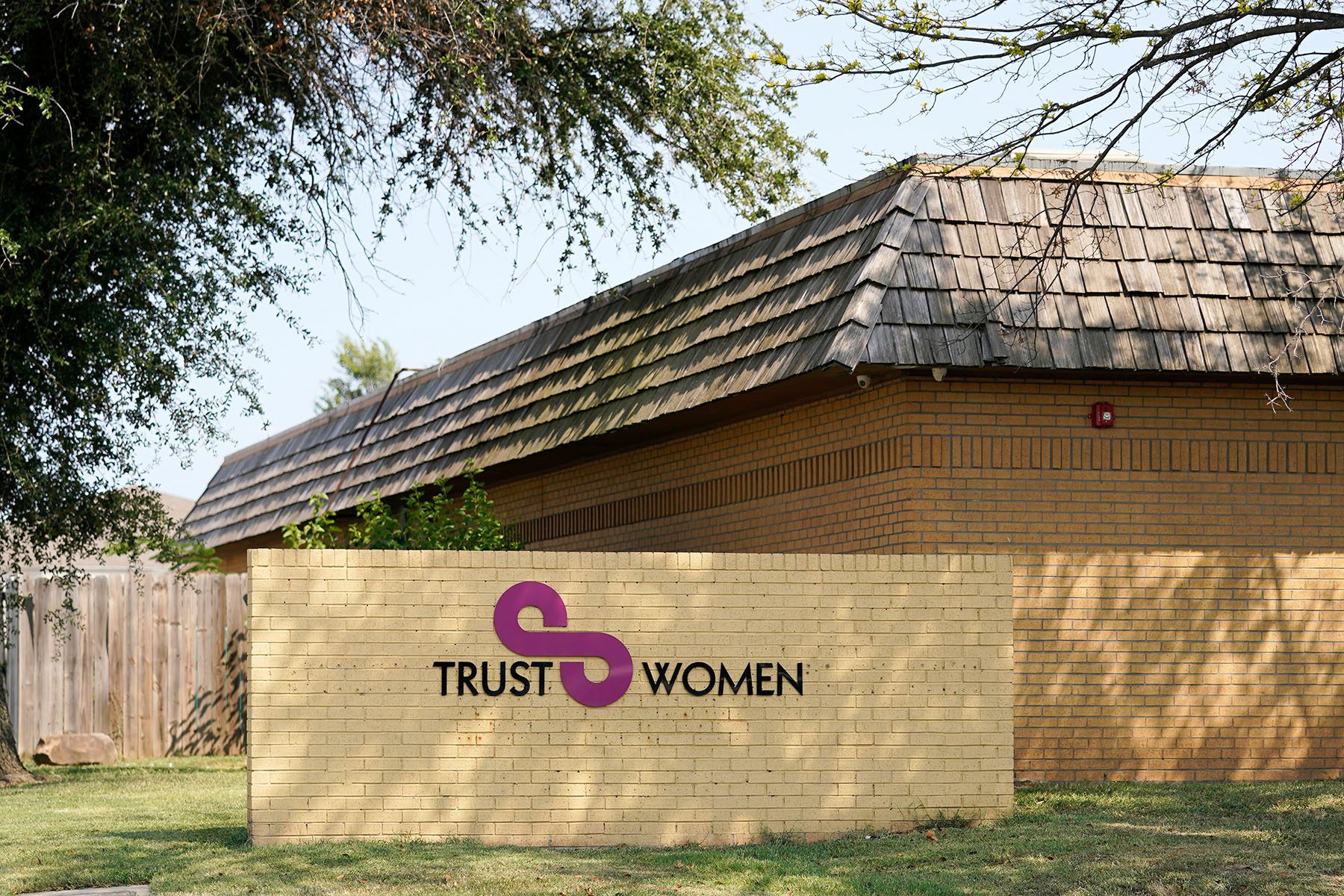
Oklahoma has been pushed to the center of the nation’s abortion battle. When last fall Texas implemented its six-week abortion ban — the strictest actively enfored restriction on the procedure in the country — thousands of residents turned to the state’s neighbors for care. Researchers estimate that each month since September, 1,400 Texans have traveled to another state for an abortion. Almost half have gone to Oklahoma.
From the day the Texas ban took effect, Oklahoma’s four clinics — two Planned Parenthoods, Trust Women and Tulsa Women’s Clinic — were overwhelmed. They began scheduling patients further out: two, sometimes three weeks in advance, rather than the week of. They increased the number of days they performed abortions.
Trust Women, with its two exam rooms and two operation rooms, would see sometimes 30 patients a day. It was the same daily number as before, but they doubled their days providing care: from two to four clinic days a week. At Planned Parenthood Oklahoma City, on the other side of town, the number of patients sometimes approached 50. They also increased the number of days they saw patients. Many had used rent checks to cover the cost of coming. One sold her car to pay for the treatment, recalled Eboni Crawford, a licensed practical nurse at the Planned Parenthood Oklahoma City clinic. The staff did abortions every week, working eight- to 12-hour days to see everyone.
And still, employees from Planned Parenthood’s Oklahoma City clinic say, it wasn’t enough. After driving hundreds of miles to get here, patients would wait hours in the clinic before it was their turn for a sonogram, said Sarah Caruana, a reproductive health assistant at the clinic. Some turned around and left, she recalled — they didn’t have child care long enough, or they hoped that, if they came back another time, the wait might be shorter.
But things are different now.
The clinic is quiet, with only a few people in the waiting room at a time. Upon entering, patients are greeted with a flier on the table, telling them all the other clinics they could drive to for an abortion. The closest are in Kansas, but other recommendations are in Colorado, Illinois, Nebraska, Arkansas and Iowa.
Abortion is still permitted Oklahoma, but at Planned Parenthood Oklahoma City, it may as well not be. The clinic has stopped scheduling the procedure altogether. The physicians who perform abortions here have to be flown in from outside of the state, and the clinic’s leaders worry it’s too difficult to predict whether patients will have to be canceled. April 12, the day Gov. Kevin Stitt signed his abortion ban, was the last day procedures were done in the building.
“Unfortunately, my feeling is it’s a thing of the past,” sighed Ginger Tiger, a registered nurse at the clinic. “Just because we have so many oppositions to us providing this care. And nobody’s relenting.”
Tiger joined Planned Parenthood soon after Texas’ six-week ban took effect. She wanted to help, she said. A former nurse at the local hospital, she kept seeing patients come in from Texas who were septic, contracting infections trying to induce abortions at home.
Patients still call, seeking appointments they can’t book. Some will walk in the door unscheduled, hoping for an appointment. Supriya Kohli, another reproductive health assistant, turned away three or four walk-ins last week, she said. She told them they could try the Tulsa clinic, just under two hours away. But even there, she couldn’t say how much longer abortions would be available.
She feels hopeless.
“I don’t think anyone in this clinic feels the reality that we will be doing abortions in this clinic anytime soon again,” she said.
In Tulsa, the state’s last two clinics are still seeing patients at capacity. But everyone knows it’s temporary.
Tulsa’s Planned Parenthood, unlike the Oklahoma City one, works with a doctor who lives nearby. That makes it easier to schedule patients than doctors flying in from out of state. But there too, the staff knows they could have to stop providing care at a moment’s notice, canceling on patients who expect to receive an abortion that day.
At Tulsa Women’s Clinic, a small independent clinic, patients can also still book appointments. The clinic is full, with 15 to 20 patients scheduled each day. But at this point, those calling for an appointment likely won’t be seen earlier than May. And at that point, staffers are warning patients, their procedure will probably have been outlawed. Their best bet is likely going somewhere else.
That’s put all eyes on Kansas. Planned Parenthood has two clinics in the state — one in Wichita and another in Overland Park, just next to Kansas City. Trust Women’s Wichita outpost is there, too. The clinic is preparing to offer abortions five days a week, in anticipation of a future surge of Texas and Oklahoma-based patients.
Crawford, of Planned Parenthood Oklahoma City, has gotten her interstate nursing license so that she can shift to caring for patients in Kansas. She plans to work from the Overland Park clinic, about five hours away.
Kiernan Cobb, Trust Women’s director of nursing, has been going to Wichita twice a week already, training staff and helping care for patients who have come for abortions. She expects that work to pick up if and when abortions in Oklahoma are outlawed.
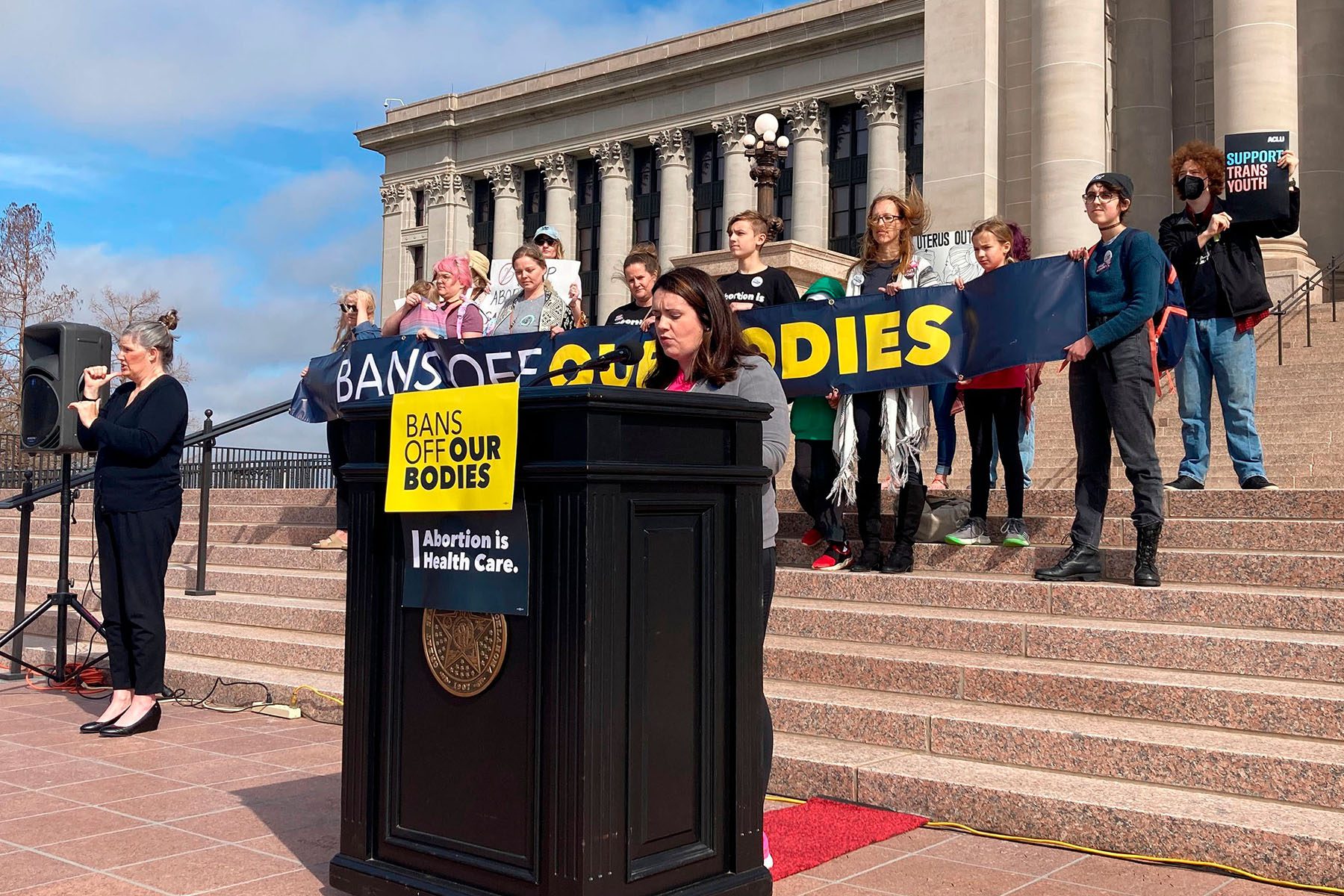
In Wichita, she’ll see people who’ve come from Houston — where Cobb lived before she moved to Oklahoma City. They’ve driven the nine hours each way to meet here, hundreds of miles from home.
“Now we both have to be up here, to be able to provide and receive this care,” she said.
In March, when Trust Women staffers first began to worry about an imminent ban, they tried to conceive of how they might get their patients to Kansas. At one point, Voellinger said, they had a van ready to go that would transport patients between clinics. That’s still on the table now if the governor signs a new ban — especially if it takes effect while patients are in the clinic.
But even in Kansas, a primarily red state but one with a Democratic governor, nobody is counting on long-term relief. This August, Kansas voters will consider an amendment that could eliminate their state constitution’s abortion protection. If Roe is overturned, and that amendment passes, there would be little to stop state lawmakers from passing their own abortion restrictions.
“We don’t know what will happen. We don’t know. And anybody who says they know has no idea what they’re talking about,” Voellinger said. “I think it’s scary to be relying on any state, frankly.”
On Friday morning — the first day in weeks the Trust Women was providing care — the clinic was buzzing. The staff were in scrubs and comfy shoes: New Balance sneakers, Crocs with rainbow socks. It was going to be a long day.
Voellinger had checked the legislature’s website last night. There was no ban being voted on today. For at least one more day, they wouldn’t have to send patients home.
Justin Bieber was playing on the radio. Voelllinger was singing. “You don’t understand how happy I was to get up to go to work this morning,” one employee said.
The patients were coming in droves. Some brought snacks. Others napped while waiting for their appointments. By 7:45, more than half a dozen patients had already shown up. Of the 19 who had made appointments, 14 were expected to come this morning. Four were from Texas, and the rest from Oklahoma. Some were just over six weeks pregnant. All were estimated to be within their first trimester.
The visiting physician, Dr. Jennifer Kerns, landed from Oakland at 3 a.m. She’d slept a few hours and come straight to the clinic. She hadn’t yet had coffee. At 8 p.m., she’d fly back home.
“People are keenly aware the landscape is changing. The last time I was here, and I imagine today, they’re relieved they were able to access this,” she said.
Kerns is scheduled to come once a month to Trust Women. But Friday was only her second time at the clinic. Her first trip here was a month ago, in March. She knows each visit here may well be the last. When she comes to Oklahoma, she buys refundable plane tickets, just in case.
“Everyone here, myself included, is of the mindset that we will be here providing care as long as we can,” she said. “Until we hear we can’t — there are people scheduled, and we’ll just continue to show up for them.”
All morning, the phone calls kept coming. The clinic had opened appointments for the following Monday and Tuesday. Tuesday still had five appointments open. After Tuesday, the next available clinic day wasn’t until May 5.
“I don’t know if you’re calling from Texas or Oklahoma,” Keisha Koubin, a clinic employee, said to one caller. But given the looming uncertainty, she added, “we are suggesting people make appointments in surrounding states.” If the caller really wanted an Oklahoma City appointment, she suggested they call back around 2 p.m. She’d see what she could do about an appointment for the following Tuesday.
Another patient called from Austin — six hours away by car. Koubin said she could offer her an appointment for Tuesday. But they were trying to book patients early in the morning, to maximize the chance they could get their abortions before any new ban might be signed and take effect. Was there any chance the woman could be there at 10:30? She took the appointment.
And, Koubin reminded her, there was still a chance the appointment could get canceled — if, say, a ban were enacted Monday. If that were the case, she recommended the woman drive the two and a half more hours to Wichita. The clinicians there would see her as soon as she could.
“We get hundreds and hundreds of calls,” Koubin said. When patients are told to go to Kansas, she added, many start crying with her on the phone.
“Not being able to help them,” she said. “That’s really hard.”
